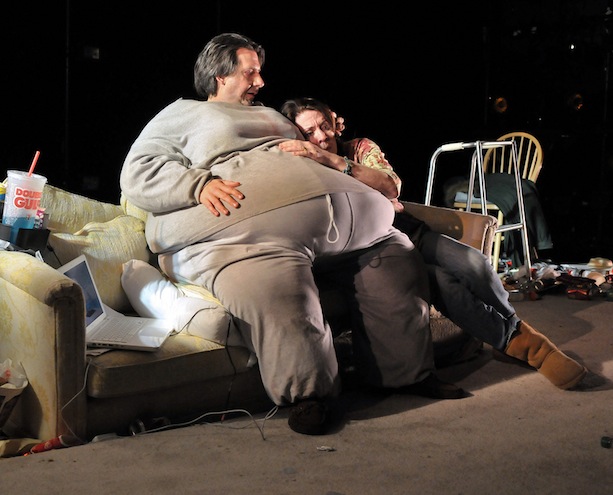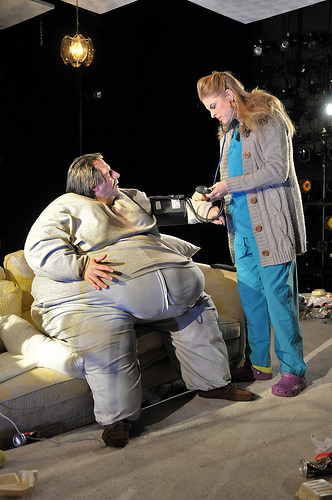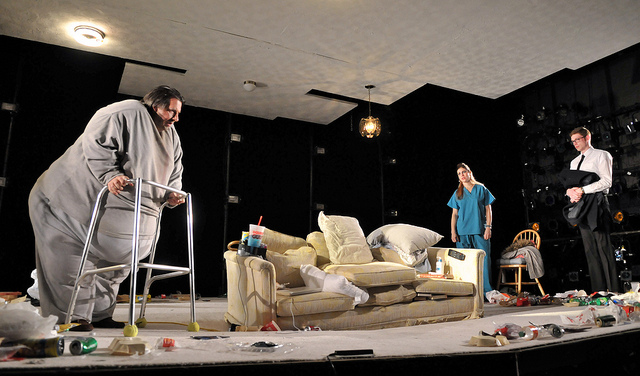Theater Review: Beached in the Living Room — “The Whale”
Unlike much of what comes through the new play development pipeline, “The Whale” proffers a coherent narrative structure — the result is a well-crafted, somewhat edgy, domestic tragedy.
The Whale, by Samuel D. Hunter. Directed by David R. Gammons. Presented by SpeakEasy Stage Company. At the Roberts Studio in the Stanford Calderwood Pavilion at the Boston Center for the Arts, Boston, MA, through April 12.

John Kuntz and Maureen Keiller in the SpeakEasy Stage Company production of “The Whale.” Photo: Craig Bailey/Perspective
By Ian Thal
The Whale traces the last week in the life of its protagonist, a reclusive and morbidly obese man named Charlie (John Kuntz). Too heavy to move without assistance, so massive that his heart can barely support the adrenaline rush that comes from masturbation (ironically, he has trouble reaching around his bulk to find his penis), he eats, sleeps, and works on his sagging couch, surrounded by the litter of hundreds of carryout meals from fast food restaurants. He is, however, gainfully employed as writing instructor for one of the online universities that proliferate in our age.
For a decade, Charlie has been eating himself to death out of self-destructive grief for his dead lover, Alan, who starved himself to death. Charlie’s friend, Liz (Georgia Lyman) is a nurse and was also affected by Alan’s death. Convinced that she is the only one who can take care of Charlie, Liz enables his self-destructive behavior, bringing him his daily supply of junk food.
Their lives are disrupted when a Mormon missionary (Ryan O’Connor) arrives at Charlie’s door. The oddity of a lone missionary (Mormon missionaries travel in pairs) is not immediately noted — but it proves to be significant. Liz is immediately hostile to Elder Thomas — she abandoned the Church of Latter Day Saints as a teenager. Both Liz and Charlie blame the Church for the death of Alan, himself the son of the local Mormon bishop.
Seeing an opportunity to find out what it was that drove his lover to starve himself, Charlie invites Elder Thomas to tell him more about his Church. Charlie also impulsively reaches out to his estranged daughter, Ellie (Josephine Elwood) and radically alters the curriculum of his writing class.
Despite living only two miles away, Ellie has not seen her father since her parents separated. She is a terror, constantly probing how far she can go insulting, bullying, and abusing others before she has to face any consequences. The pollyannaish Charlie is convinced that this monster of a teenager is a secret altruist. Bringing an emotionally unhinged adolescent into his home eventually brings Charlie’s ex-wife, Mary (Maureen Keiller) through his front door.
For some, a thin actor wearing a fat suit might be problematic, but Kuntz should be admired both for his stamina (the costume is estimated to weight 60 pounds), and the skill with which he crafts his modulated dramatization of Charlie’s character and body. Lyman manages to pack all the contradictions of Liz’s personality in a manic whole: caring and enabling, informed and in denial. Elwood brings a dangerous single-mindedness to Ellie’s physical and emotional aggression. She also has some strong physical business with O’Connor, who also manages a very convincing physical portrait of being stoned on cannibis in a later scene. Keiller, who does not appear until after intermission, also puts in a compelling performance as the beleaguered Mary, whom we realize has been protecting Charlie from their daughter all these years.

John Kuntz and Georgia Lyman in the SpeakEasy Stage Company production of “The Whale.” Photo: Craig Bailey/Perspective Photo.
Director David R. Gammons, in league with Hunter’s script, keeps the performances grounded in naturalism, while opting for some more stylized choices in the design of the show. Cristina Todesco’s cut-away set exposes the lighting rigs on the back and stage right walls of the theater, evoking the rib cage of a whale’s carcass, while she has Charlie’s couch threatening to collapse through the floor into a sea of food containers no doubt inspired by the Great Pacific garbage patch.
Hunter is a playwright with the pedigree that allows him to be in the so-called new play pipeline: he is a alumnus of prestigious playwriting programs (NYU, Juilliard, and the Iowa Playwrights Workshop), lives in New York, and his scripts premiere at high-profile New York theaters (such as Playwrights Horizons) before they are picked up by regional theaters. Like the playwrights typically found in the group, he creates strong dialogue and well-rounded characters. Unlike much of what comes through this conventional channel, The Whale also proffers a coherent narrative structure — the result is a well-crafted, somewhat edgy, domestic tragedy.
However, despite Hunter’s skill as a dramatist, his play raises questions about how fat people are represented on American stages. A male actor can be beefy, pudgy, or have a gut, but the issue of representation is narrower when it comes to casting actresses. They are expected to be thin — this is an elemental part of the culture of acting conservatories, film and television. A larger man’s size, so long as it does not impede his performance on stage, does not impede a variety of characterizations. Larger women (and by larger, one often means “not-thinner than average”) are relegated to comic roles. Last season, in a theater company’s production of The Merchant of Venice, the actress who was best suited to play the character of Portia had been cast in the secondary role of Nerissa. I did not want to speculate in the review about this obvious (to me) miscasting, but any time I think back on that production I can’t help but wonder if that was because the actress best suited to play a noble woman of great intelligence happened to be noticeably (though hardly exceptionally) thicker and rounder than the actress who received the part. In fact, despite the growing number of female directors and artistic directors amongst Boston’s smaller companies, and despite the notion that “fat is a feminist issue,” I can only think of one or two companies that genuinely cast actresses of all sizes.
Of course, Charlie is of a size that can only be described as morbidly obese — his enormous weight is killing him. It is unlikely that an actor – having grown beyond 600 pounds – would have the stamina to continue working in the theater. Thus the necessity of a much thinner actor in a fat-suit (rented from the original production) and prosthetics. (Would a play with a similarly-sized woman as a protagonist have ever made the cut in the New York to regional theater pipeline?) Hunter is aware that most in the audience would (most likely) be disgusted by a person of Charlie’s size — he is so large that he can no longer bathe himself. So the playwright gives Charlie far fewer edges than those he gives to the play’s more conventionally-sized characters. The depth of Charlie’s self-loathing is mostly kept in check. While he is physically repulsive to some around him, he is also kind, generous, bravely accepting of his immanent death, and rarely removes his rose-tinted glasses.
Also, Hunter’s use of a whale as a central motif is rather tenuous. True, fat people are often disparagingly likened to whales, but the efforts to link Charlie with the great whales of literature — Moby-Dick, or the big fish that swallowed the prophet Jonah — are forced. Both Moby-Dick and Jonah’s big fish are powerful, mobile forces of nature. Charlie is sick and helpless on his living room couch.

John Kuntz, Georgia Lyman, and Ryan O’Connor in the SpeakEasy Stage Company production of “The Whale.” Photo: Craig Bailey/Perspective Photo.
The play’s parallels with Moby-Dick have less to do with the titular whale than with a student essay that Charlie keeps by his side at all times. The paper notes that Ishmael and Queequeg share a bed, as he once did with Alan. The invocation of Jonah is even more tangential, since it does not accurately retell the story: Jonah is swallowed by the big fish not as punishment, but to save his life after he threw himself into the sea in order to save the lives of sailors ferrying him across the Mediterranean. Jonah was swallowed after he accepted his responsibility for the lives of others. The most obvious parallel in the play with Jonah, left unstated, is between Jonah angrily turning in upon himself (after the people of Nineveh listened to his prophecies and atoned for their sins), and Alan’s starving himself to death.
Indeed, the most compelling resonance in the production between Charlie and whales is David Remedios’ masterful sound design, which incorporates songs whales use to communicate over great distances, much as Charlie communicates with his students using e-mail, discussion groups, and voice over internet protocols. Remedios incorporates sounds of churning oceans, Kuntz’ own breathing and other corporeal gurgling. The mix, played through the PA system, often gives the audience the impression that it is inside of Charlie’s body, listening.
Elder Thomas doesn’t convert any of the other characters (both Charlie and Liz have been deeply hurt by the Church while Ellie’s anti-religious stance is an extension of her nihilism), but he proves to be an articulate spokesman for the Mormon faith, more so than either the Mormon missionaries I have encountered in real life or in contemporary theater, such as in Kushner’s Angels in America or in Parker, Lopez and Stone’s Book of Mormon. His arguments may not convince any in the audience, but Hunter presents Thomas’ faith with an authenticity that effectively counters the easy ridicule of both Liz and Ellie.
Less convincing is Charlie’s last-ditch attempt to shift pedagogical gears. In just a few days, he goes from encouraging his students to critically engage with classic texts in clear prose to asking them to submit unedited, personal writings about their insecurities as college students in the early 21st century. In a culture filled with inarticulate young men and women confessing to every insecurity under the sun, the experiment comes off as lightweight.
Ian Thal is a performer and theatre educator specializing in mime, commedia dell’arte, and puppetry, and has been known to act on Boston area stages from time to time, sometimes with Teatro delle Maschere, and on occasion served on productions as a puppetry choreographer or dramaturg. He has performed his one-man show, Arlecchino Am Ravenous, in numerous venues in Massachusetts and Rhode Island, and is currently working on his second full length play; his first, though as-of-yet unproduced, was picketed by a Hamas supporter during a staged reading. Formally the community editor at The Jewish Advocate, he blogs irregularly at the unimaginatively entitled From The Journals of Ian Thal, and writes the “Nothing But Trouble” column for The Clyde Fitch Report
Tagged: David R. Gammons, Samuel D. Hunter, SpeakEasy Stage Company
